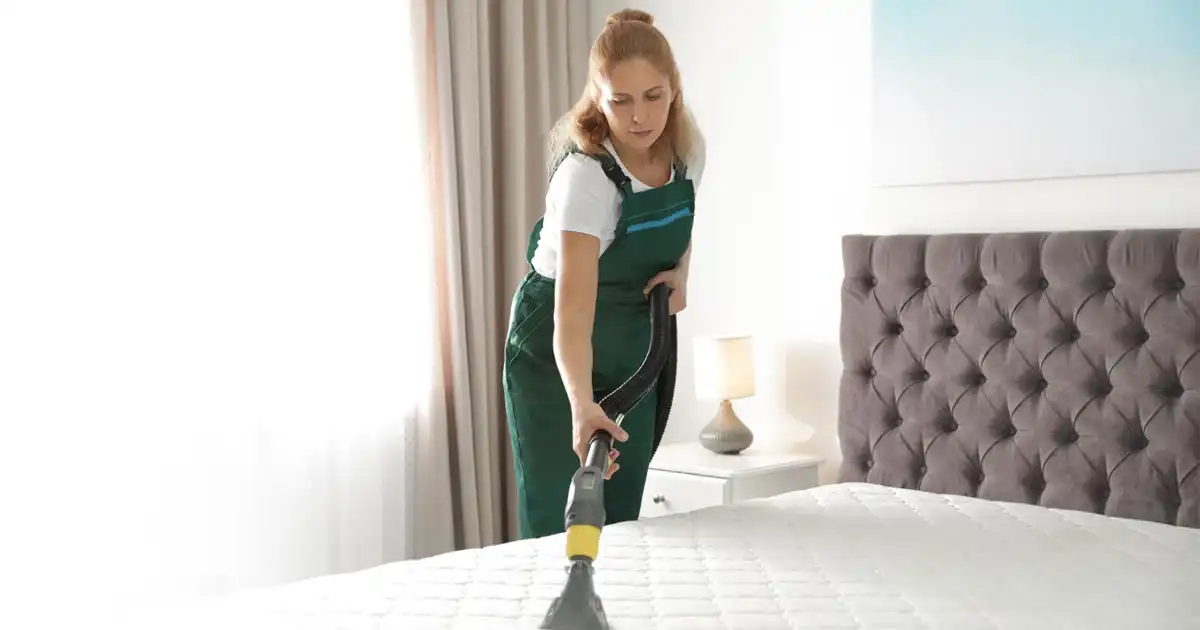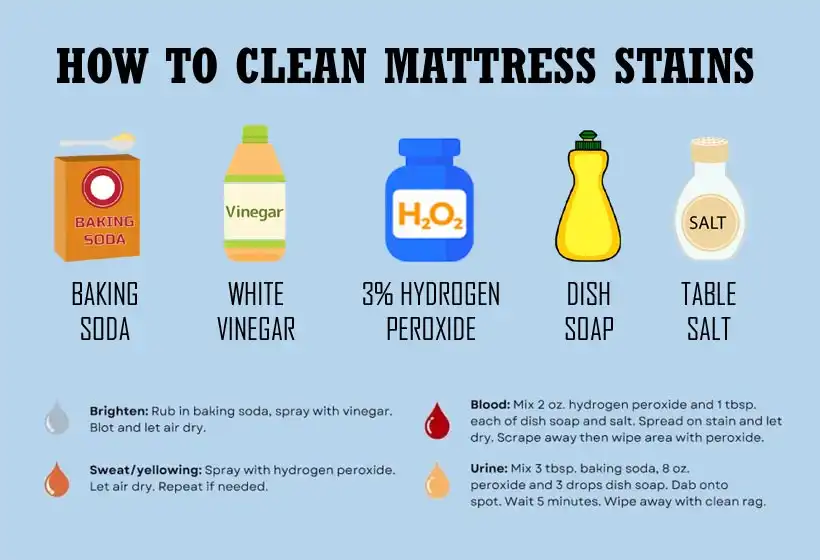Best Guide on How to Get Rid of Mattress Stains

It’s a lazy Sunday morning, and you’re enjoying a breakfast-in-bed treat. You’re savoring every bite of your delicious meal when suddenly —oops! a spill happens. Now, instead of basking in comfort, you’re staring at an unsightly stain spreading across your mattress.
How do I get rid of mattress stains?
This question might race through your mind as you scramble to clean up the mess. Whether it’s coffee, wine, or pet accidents, mattress stains can be a real headache.
But fear not! With a few handy tips and tricks, you can tackle those stubborn stains and keep your mattress looking pristine. And with the 4th of July Sale 2024 just around the corner, it’s the perfect time to not only clean but also possibly upgrade your mattress. Keep reading for our comprehensive guide on stain removal and mattress care.
Why Should You Clean Your Mattress?
Your mattress may have the longest lifespan of any item in your home, providing comfort and support for seven to ten years or longer. But to get that kind of long-lasting support, you need to take good care of it. Cleaning your mattress is not just about longevity—it’s also about health and hygiene.
You spend about a third of your life in bed. During that time, your mattress absorbs sweat, bodily fluids, and can collect bacteria, pet dander, skin flakes, food crumbs, fungal spores, microbes, and dust mites. Regular cleaning helps keep these at bay, ensuring a healthier sleep environment.
How Often Should You Clean Your Mattress?
A regular cleaning routine keeps your mattress free from bacteria, allergens, and other unwanted guests. But don’t worry; you don’t need to clean your mattress as often as your sheets. Here’s a simple routine to follow:
- Spot treat spills and stains immediately
- Vacuum your mattress monthly
- Clean your mattress thoroughly twice a year
Before you start cleaning, check the manufacturer’s recommendations and understand your mattress warranty. Many warranties do not cover damages like discolorations or stains from liquid spills or cleaning products.
How to Clean a Mattress?

For any kind of stain, always check the care label on your mattress for specific recommendations. Never drench a mattress with water or liquid cleaners, especially memory foam mattresses. They don’t dry quickly and can develop mold and mildew.
A good DIY solution is ¾ cup warm water, ¼ cup vinegar, and a tablespoon of liquid dish soap in a spray bottle. This combo can tackle most stains effectively.
Four Steps to Remove Stains from Your Mattress
Experts recommend this basic four-step plan for treating most minor mattress stains:
- Step 1: Absorb
For wet stains, blot with a dry towel until no more liquid can be absorbed. Don’t rub or scrub. Blot and use pressure to remove as much wetness as possible. For dry mattress stains, scrape off or vacuum up any excess mess. Slightly wet the area using a damp cloth, then move to step 2.
- Step 2: Add Soap
Lightly spray or dab the cleaner you’re using onto the area. Some mattress stains, such as blood, need to sit with the cleaning solution on for 10 to 15 minutes. Refer to the specific stain-by-stain instructions in the next section for more details.
- Step 3: Blot
Press and blot with a dry cloth or paper towels to absorb the liquid. Keep blotting until you can’t get any more liquid out. Repeat steps 2 and 3 if necessary.
- Step 4: Air Dry
Putting the mattress outside in the sun is ideal, but if that’s not possible, just get as much air circulation and sunlight in the room as you can. Open windows, curtains, or blinds, and set up a fan. Depending on the size of the mattress stain, it may take several hours to dry completely.
- Optional Step: Deodorize
Once the mattress is totally dry, sprinkle a little bit of baking soda over the area (a sifter works well) to absorb lingering odors. This can help make your bedroom smell fresh and clean.
How to Remove These Most Common Types of Mattress Stains?
Different types of stains require different cleaning methods. Here’s how to tackle the most common mattress stains.
- Blood Stains
What to use: White vinegar or 3% hydrogen peroxide.
How to use:
- Pour a small amount of vinegar or peroxide directly onto the stain.
- If using vinegar, let it soak for 10 minutes, blot dry, and repeat if necessary.
- If using hydrogen peroxide, it will foam on contact with blood. Blot the foam away, let it sit for 5 minutes, then dab with a towel dipped in cold water to rinse.
- Pet Urine Stains
What to use: An enzyme-based upholstery cleaner.
How to use:
- After absorbing as much liquid as possible, apply the cleaner and let it sit for 15 minutes.
- Dab with a clean towel dipped in cool water.
- Soak up the liquid again and air dry.
- Human Urine Stains
What to use: A solution of hydrogen peroxide, baking soda, and dish soap.
How to use:
- Combine 8 ounces of hydrogen peroxide, 3 tablespoons of baking soda, and half a teaspoon of dish soap in a spray bottle.
- Shake gently, spritz onto the stain, and let it sit before blotting dry.
- Vomit Stains
What to use: Baking soda and an enzyme-based cleaner.
How to use:
- Scrape the surface clean and blot to absorb moisture.
- Apply baking soda, let it sit, then vacuum.
- Apply the enzyme cleaner, absorb the liquid again, and air dry.
- Coffee Stains
What to use: Vinegar and dish soap solution.
How to use:
- Absorb the liquid if fresh, or dampen with warm water if dry.
- Blot with a dry cloth.
- Dab with the vinegar solution, blot dry, and rinse with a cloth dampened with warm water.
- Wine Stains
What to use: Cold water and salt, or Wine Away.
How to use:
- Absorb as much liquid as possible.
- Apply Wine Away or sprinkle salt, wait, then dab with cold water.
- Blot dry and repeat if necessary.
- Oily Foods or Lotion Stains
What to use: Baking soda and dish soap.
How to use:
- Scrape off as much grease as possible.
- Sprinkle with baking soda, let it sit, then vacuum.
- Dab with a solution of dish soap and warm water.
- Blot dry and air dry.
Mattress Accessories to Prevent Stains
Mattress protectors, pads, and toppers can protect your mattress and make cleaning easier when spills happen.
- Mattress Protectors
These are cost-effective and work like fitted sheets with extra padding. Mattress protectors can be washed with your regular linens and help prevent staining.
- Mattress Pads
These wrap around the sides of your mattress, adding an extra layer of comfort and protection against stains.
- Mattress Toppers
These are thicker and can change the overall feel of your mattress. They offer some protection but are mainly for added comfort.
Mattress Cleaning Mistakes to Avoid
Keep your mattress in tip-top shape by avoiding these common cleaning mistakes:
- Oversaturating your mattress with liquids.
- Failing to let the mattress dry completely.
- Using harsh chemical cleaners.
- Not checking manufacturer’s care instructions.
- Not consulting the mattress warranty.
- Not cleaning your mattress regularly.
How do I get rid of mattress stains at home?
Knowing how to get stains out of a mattress when dry and how to remove stains from a mattress without hydrogen peroxide can save your mattress from permanent damage. A good mattress stain remover and the right techniques can make all the difference. And if you’re looking for how to get stains out of a mattress with baking soda or need a mattress stain remover spray, the tips above will guide you.
Enhance your sleeping experience and protect your investment with these mattress care tips. And remember, the 4th of July Sale 2024 offers exciting deals on top mattresses at smartmattressbuy.com — don’t miss out!
FAQs on How Do I Get Rid of Mattress Stains?
- How do I clean a mattress topper?
Mattress toppers should be cleaned similarly to how you clean a mattress, not like sheets or bedding. Most toppers cannot be machine washed and should be spot-treated. Wondering how do I get rid of mattress stains at home on a topper? Use a gentle cleaner and follow the same steps as you would for the mattress itself.
- How do I clean a memory foam mattress?
Memory foam mattresses should be kept clean and dry. Consult your manufacturer for the best care and cleaning instructions. When wondering how to get stains out of a mattress when dry, it’s crucial to handle memory foam with care to avoid damage.
- Can you steam clean a mattress?
Most mattresses can be steam cleaned, but it’s a good idea to check with your mattress manufacturer and the steam cleaner’s manufacturer to ensure you are not voiding your warranty. Steam cleaning can be an effective mattress stain remover spray technique.
- Can you use UV light to sanitize your mattress?
UV light can sanitize your mattress as effectively as sunlight. UV light can help kill bacteria and microbes on your mattress but will not remove stains. For how do I get rid of mattress stains, you’ll need to combine UV light sanitation with stain-removal techniques.
- Can you bleach a mattress, or will it ruin a mattress?
Using bleach to clean mattress stains is not recommended because it is too harsh for the mattress material and can spread the stain. Bleach may stain, damage, or void your mattress warranty. For how to remove stains from mattress without hydrogen peroxide, consider milder alternatives like vinegar or baking soda.
- Can you shampoo a mattress?
Shampooing is not recommended for cleaning your mattress. Always consult your manufacturer’s care instructions for the right products to clean and protect your mattress. Using a mattress stain remover spray designed for this purpose is a better option.
- How do you make a dirty mattress white again?
Cleaning your dirty mattress with baking soda and hydrogen peroxide can make it white again. If you need to know how to get stains out of mattress with baking soda, sprinkle it generously on the stained area, let it sit, then vacuum it up.
- Are mattress stains permanent?
If not cleaned for a long period, mattress stains can become permanent. For how do I get rid of mattress stains at home, timely intervention is key to preventing stains from setting in permanently.
- Does hydrogen peroxide remove mattress stains?
Yes, hydrogen peroxide is great for cleaning mattress stains. However, if you’re looking for how to remove stains from mattress without hydrogen peroxide, try alternatives like vinegar or a mattress stain remover spray.
- What causes yellow stains on a mattress?
Pet urine, human urine, vomit, coffee, and oily foods or lotions can cause yellow stains on a mattress. If you’re dealing with these issues, knowing how to remove yellow stains from mattress can help keep your mattress looking clean and fresh.
